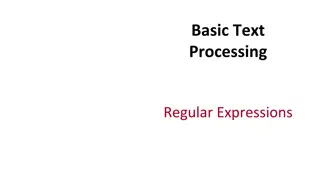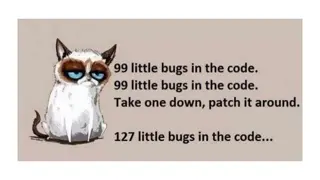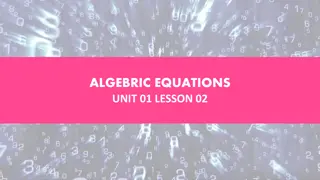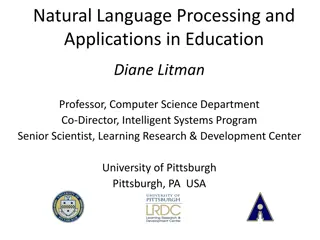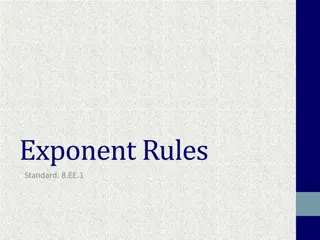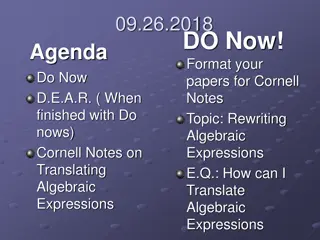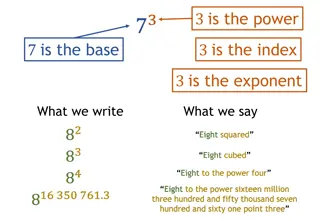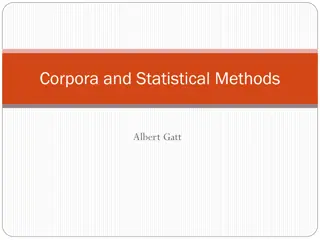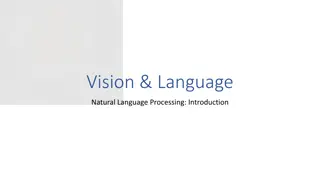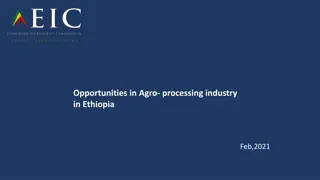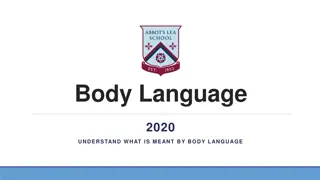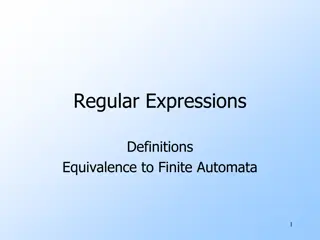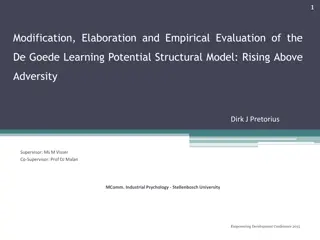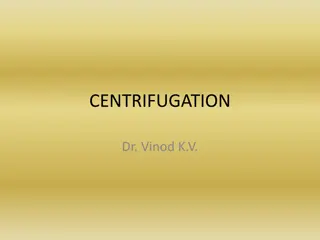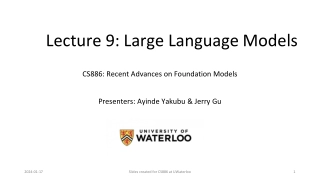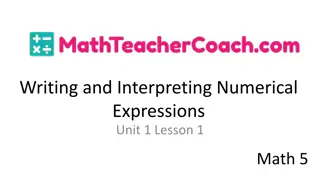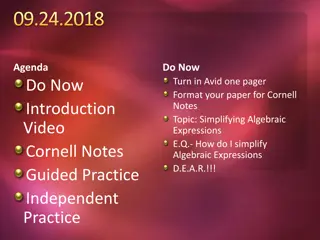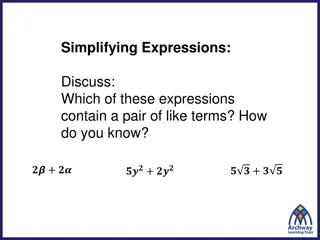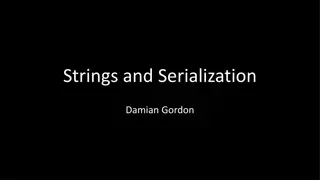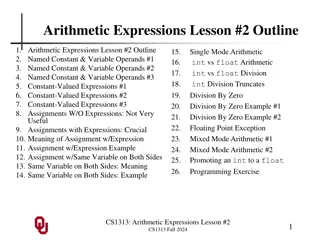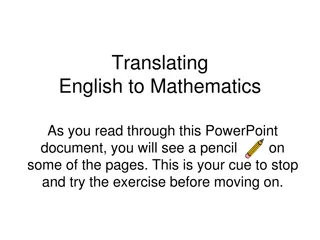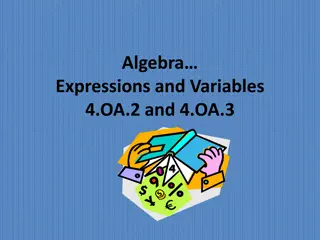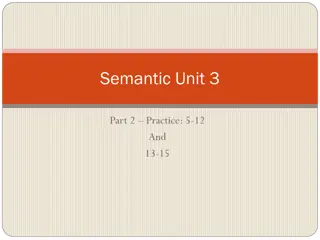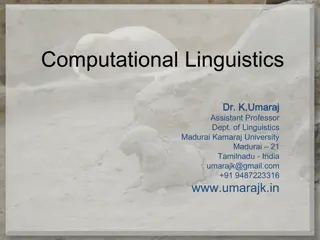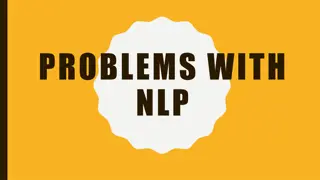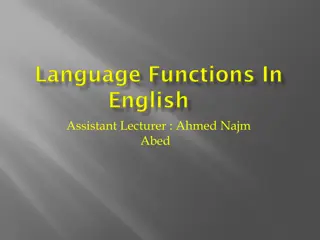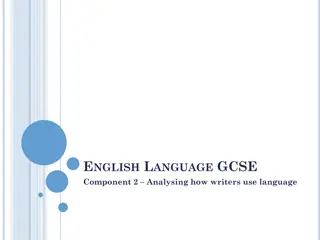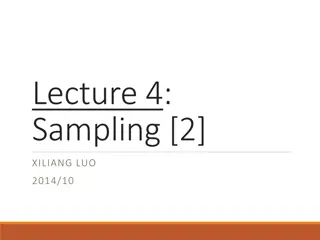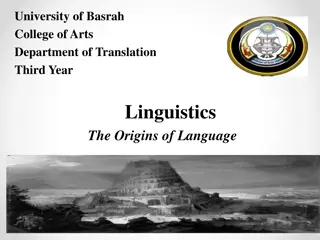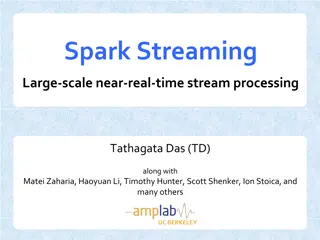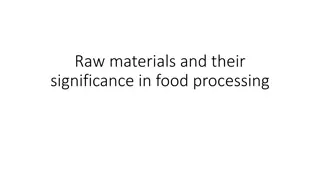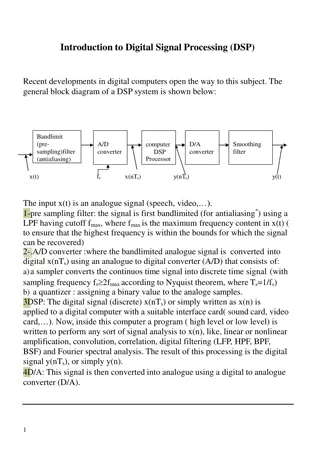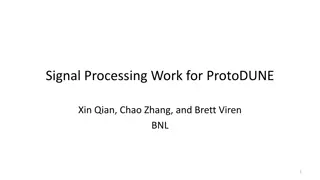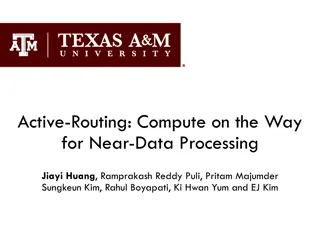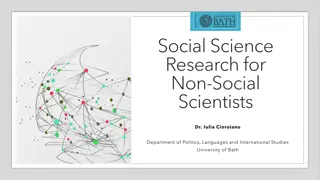Understanding Empirical vs Analytical Expressions in Natural Language Processing
Restricted quantifiers and literal analysis in natural language processing reveal the distinctions between empirical and analytical expressions. While empirical expressions refer to non-trivial intensions that require empirical investigation, analytical expressions denote constant intensions that can be understood without empirical evidence. Examples and definitions illustrate these concepts, shedding light on the different types of expressions used in linguistic analysis.
- Natural Language Processing
- Empirical Expressions
- Analytical Expressions
- Quantifiers
- Literal Analysis
Download Presentation

Please find below an Image/Link to download the presentation.
The content on the website is provided AS IS for your information and personal use only. It may not be sold, licensed, or shared on other websites without obtaining consent from the author. Download presentation by click this link. If you encounter any issues during the download, it is possible that the publisher has removed the file from their server.
E N D
Presentation Transcript
Lecture 3 Natural Language Processing Restricted quantifiers & literal analysis Empirical vs. analytical expressions Partiality; requisites vs. pre-requisites Presuppositions vs. mere entailment Two kinds of negation https://elogika.vsb.cz/evidence/ 1
Restricted quantifiers w t x [[0Studentwtx] [0Cleverwtx]] w t x [[0Studentwtx] [0Lazywtx]] w t x[[0Studentwtx] [0Retiredwt x]] All students are clever. Some students are lazy. No student is retired. These analyses are not the literal ones, because they are not in harmony with the so-called Parmenides principle and with our method of literal analysis; the sentences do not mention , . Hence,we introduce restricted quantifiers: All, Some, No, Most, of type (( ( ))( )) [0All M], M v ( ),v-constructs the set of all supersets of M [0Some M], M v ( ),v-constructs the set of those sets that have a non-empty intersection with M [0No M], M v ( ),v-constructs the set of all sets that have an empty intersection with M w t [[0All0Studentwt] 0Cleverwt] w t [[0Some0Studentwt] 0Lazywt] w t [[0No0Studentwt] 0Retiredwt] 2
Empirical expressions Empirical expressions denote non-trivial (i.e. non-constant) intensions King of France , the prezident of R , the highest mountain denote offices (roles) of type , and actually refer (in this w and t of evaluation) to nothing, Petr Pavel and Mount Everest, respectively. Yet the referred object must be found out empirically; it is beyond the logical analysis Predicates like to be a student , to be red , to be happy , to be of the age 60 denote properties of type ( ) and refer to their population, i.e. to a set of individuals who happen to be students, red, happy and of the age 60, respectively. Sentences like Prague is greater than Brno denote propositions of type and refer to a truth-value (this sentence to T). Hence these expressions are empirical, because the object to which they happen to refer in a given state of the world is beyond logical analysis; it can be determined only by empirical investigation of the state of the world at a given time moment. 3
Analytic expressions Analytic expressions denote extensions or trivial (i.e. constant) intensions The objects they denote and refer tocan be determined by mere understanding a given expression, without empirically investigating the state of the world. Mathematical and logical expressions are analytical, they denote extensions Expressions that contain empirical subexpressions are analytical, if they denote constant intensions. Hence the referred object is necessarily, in all worlds w and times t one and the same. No bachelor is married Whales are mammals Denote the constant proposition TRUE/ , that takes the value T in all w and t 4
Analytic expressions No bachelor is married TRUE Bachelor, Married/( ) ; No/(( ( ))( )) w t [[0No 0Bachelorwt]0Marriedwt] How to prove its analyticity? Let us define and refine: m, n/ 1 v( ), x v : 0No = m n x [[m x] [n x]], [[0No m] n] = x [[m x] [n x]]. 0Bachelor = w t x [ [0Marriedwtx] [0Manwtx]]. (to be unmarried and man are requisites of the property of being a bachelor) [[0No 0Bachelorwt] 0Marriedwt] = x [[0Bachelorwtx] [0Marriedwtx]] = x [ [0Marriedwtx] [0Manwtx] [0Marriedwtx]]. For every valuation of w, t v-constructs T, thus we can generalize: w t x [ [0Marriedwtx] [0Manwtx] [0Marriedwtx]]. 5
Quines paradox Necessarily, 8 > 5 The number of planets = 8 Necessarily, the number of planets > 5 ??? w t [0> 08 05] w t [[0Number_of0Planetwt] = 08] w t [0> [0Number_of0Planetwt] 05] (analytical necessity) (empirical fact) (empirical fact, not necessary) Types. Number_of/( ( )): the number of elements of a finite set; Planet/( ) ; >, =/( ) Proof: 1) [0> 08 05] 2) [[0Number_of0Planetwt] = 08] 3) [0> [0Number_of0Planetwt] 05] 4) w t [0> [0Number_of0Planetwt] 05] Comment. In the last step we must not introduce , because the variables w, t were bound by rather than 1. assumption, E 2. assumption, E 1, 2 Leibniz, subst. of identicals 3, I 6
Partiality, v-improper constructions Application of a function f to an argument a such that f is not defined at a [0:x00] is v-improper for any valuation v x [0:x00] is not v-improper, as it constructs a degenerate function [0Improper0[0:x00]] constructs T Improper/( 1): the class of constructions v-improper for any v. Incoherent typing If X is not a construction of order n (n 1), then 1X is improper; (a non-procedural object cannot be executed) If X is not a construction of order n (n 2), then 2X is improper; (a non-procedural object cannot be executed) If X, X1, , Xnare not constructions typed to produce objects of types according to Def., then [XX1 Xn] is improper by failing to v- construct anything for any valuation v. Example. Tom/ ; 5/ ; Student/( ) w t [0Studentwt05], 2[ w t [0Studentwt0Tom]] 0[0:x00] is not v-improper, as it constructs the Composition [0:x00] 7
Partiality and Compositionality If five divided by zero equals five, then Tom is the Pope denotes the degenerate proposition undefined at all w,t ! w t [[[0:0500] = 05] [0Tom = 0Popewt]] . 0, 5/ ; :/( ); Tom/ ; Pope/ ; [0:0500] ; [[0:0500] = 05] ; 0Tom ; 0Popewt v ; [0Tom =0Popewt] v ; [[[0:05 00] = 05] [0Tom =0Popewt]] v . The relation = does not get the first argument, hence the implication truth-function also does not get the first argument; therefore, the whole Composition is v-improper by failing to construct anything. Partiality is propagated up. The Closure degenerate proposition 8
Partiality and Compositionality If you intuitively feel that the sentence could be true, because the speaker wanted to say that it is not true that five divided by zero is five, we must analyse this sentence like this: If it is true that five divided by zero equals five, then Tom is the Pope . True*/( n): the class of those constructions that v- construct T for every valuation v. [0True* 0C] v-constructs T, iff C v-constructs T for any valuation v, otherwise F. w t [[0True*0[[0: 0500] = 05]] [0Tom =0Pape wt]] Now the Closure constructs the proposition TRUE. The sentence is analytically true 9
Partiality and Compositionality False*/( n) and Improper*/( n) are classes of constructions that v-construct F or are v- improper for all valuations v, respectively: [0True* 0C] = [0False* 0C] [0Improper* 0C] [0False* 0C] = [0True* 0C] [0Improper* 0C] [0Improper* 0C] = [0True* 0C] [0False* 0C] Similarly, and frequently, we often need these properties of propositions:True, False, Undef/( ) 10
properties of propositions True, False, Undef/( ) P,Q [0Truewt P] v-constructs T if [Pwt= 0T], otherwise F [0Falsewt P] v-constructs T if [Pwt= 0F], otherwise F [0Undefwt P] = [0Truewt P] [0Falsewt P] 11
Requisites Requisite is an analytically necessary relation-in-extension between two -intensions such that, necessarily, any -object that instantiates one intension also instantiates the other (though not necessarily the other way around). For instance, if the office of Head of State of the Vatican is a requisite of the office of Bishop of Rome (i.e. the office of Pope) then, necessarily, whoever occupies the papal office must also occupy the requisite office. Req/( ); Between properties ( ) ; True/( ) [0Req [0Unmarried 0Man] 0Bachelor] = [ w t x [[0Truewt w t [0Bachelorwt x]] [0Truewt w t [[0Unmarried 0Man]wtx]]]] 12
requisities [0ReqF G] = w t x [[0Truewt w t [Gwtx]] [0Truewt w t [Fwtx]]] F, G ( ) Gloss. The property F is a requisite of the property G iff necessarily, for all x holds: if x happens to be a G then x is an F Examples. No bachelor is married All whales are mammals [0Req 0Mammal 0Whale] = w t [ x [[0Truewt w t [0Whalewt x]] [0Truewt w t [0Mammalwt x]]]] The president of CR is a Czech citizen w t [[0Existwt w t [0Pres-ofwt 0CR]] [0Truewt w t [[0Czech 0Citizen]wt[0Pres-ofwt 0CR]]]] Being a Czech citizen is a requisite of the Czech presidential office Types. Czech/(( ) ( ) ): property modifier; Citizen/( ) ; [0Czech 0Citizen] ( ) 13
Pre-requisites; presuppositions Tom never smoked Tom stopped smoking Can the second sentence be true or false under the assumption of the first sentence? If Tom never smoked, he couldn t stop smoking the sentence (2) is false (?) But then it is true that Tom did not stop smoking he still smokes (?) The sentence (2), or rather the proposition denoted by (2) has no truth-value Being an ex-smoker is a prerequisite of the property Stop- smoking The presupposition of (2) is the proposition that Tom previously smoked 1. 2. 14
Pre-requisites; presuppositions Prereq/( ( ) ( ) ) Definition (prerequisite relation) Let X,Y be constructions such that X,Y/ n ( ) ; x . Then [0Prereq Y X] = w t [ x [[[0Truewt w t [Xwtx]] [0Falsewt w t [Xwtx]]] [0Truewt w t [Ywtx]]]]. Gloss definiendum as, Y is a prerequisite of X , and definiens as, Necessarily, any x for which it is true or false that x instantiates X at w, t then x also instantiates Y at w, t . Corollary. If it is not true that x instantiates the prerequisite Y of the property X then the proposition that x instantiates X is neither true not false, it has not truth-value. Hence, the proposition that x instantiates Y is a presupposition of the proposition that x instantiates X. The property of being a previous smoker is not only a requisite of the property of having stopped smoking, it is its prerequisite. 15
Presupposition vs. mere entailment Analytical entailment is defined as follows (P, S/ n , /( )). (S P) iff w t [[0TruewtS] [0TruewtP]] The logical difference between a presupposition and mere entailment is this: P is a presupposition of S iff (S P) and (non-S P) P is merely entailed by S iff (S P) and neither (non-S P) nor (non-S non-P) Comments. If P is a presupposition of S and P is not true at a given w, t -pair, then neither S nor non-S is true. Hence, S has no truth-value at such a w, t -pair at which its presupposition is not true. On the other hand, if P is merely entailed by S, then if S is not true we cannot deduce anything about the truth-value, or lack thereof, of P. Definition (presupposition vs. mere entailment) Let P and S be propositional constructions (P, S/ n ). Then P is entailed by S iff w t [[0TruewtS] [0TruewtP]] P is a presupposition of S iff w t [[[0TruewtS] [0FalsewtS]] [0TruewtP]] (Question. Do you know why we need here the property True?) 16
Presupposition vs. mere entailment Examples. The King of Germany is wise presupposes that the King of Germany exists If the King of Germany does not exist, then the King of Germany is (isn t) wise has a truth-value gap, neither true nor false Police found the murderer of JFK merely entails that the murderer of JFK exists If the unique murderer of JFK does not exist, then it can be true that police did not find the murderer of JFK 17
finding Recall the tragedy in Dallas on Friday, November 22, 1963 John Fitzgerald Kennedy, the 35th President of the United States, was assassinated at 12:30 p.m.Central Standard Time in Dallas, Texas, while riding in a presidential motorcar through Dealey Plaza. Lee Oswald was arrested by the Dallas Police Department 70 minutes after the initial shooting. Oswald was charged under Texas state law with the murder of Kennedy, as well as that of Dallas policeman J. D. Tippit, who had been fatally shot a short time after the assassination. At 11:21 a.m. November 24, 1963, as live television cameras were covering his transfer from the city jail to the county jail, Oswald was fatally shot in the basement of Dallas Police Headquarters by Dallas nightclub operator Jack Ruby. 18
finding After a 10-month investigation, theWarren Commission concluded that Oswald assassinated Kennedy, that Oswald had acted entirely alone, and that Ruby had acted alone in killing Oswald. Question (during the Warren commision investigation). Did the police find the only murderder of JFK? Answer. No, not yet. True If the existence of the only murder of JFK were a presupposition of Police s finding, could the answer be truly NO? Hence, the existence is here merely entailed but not presupposed. 19




